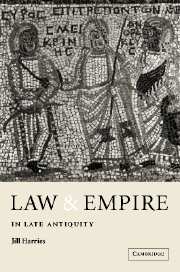Book contents
- Frontmatter
- Contents
- Preface
- Introduction
- 1 The law of Late Antiquity
- 2 Making the law
- 3 The construction of authority
- 4 The efficacy of law
- 5 In court
- 6 Crime and the problem of pain
- 7 Punishment
- 8 The corrupt judge
- 9 Dispute settlement I: out of court
- 10 Dispute settlement II: episcopalis audientia
- Conclusion
- Bibliography
- Index
1 - The law of Late Antiquity
Published online by Cambridge University Press: 22 September 2009
- Frontmatter
- Contents
- Preface
- Introduction
- 1 The law of Late Antiquity
- 2 Making the law
- 3 The construction of authority
- 4 The efficacy of law
- 5 In court
- 6 Crime and the problem of pain
- 7 Punishment
- 8 The corrupt judge
- 9 Dispute settlement I: out of court
- 10 Dispute settlement II: episcopalis audientia
- Conclusion
- Bibliography
- Index
Summary
Law was, in theory, the ‘art of the good and the fair’. Many citizens of the Roman Empire thought otherwise. As so much of what was written about the operation of law derived from a discourse about law, which confused perceptions, tendentious rhetoric and fact, some sense of the framework of the contemporary debate is required. The terms were cogently set out by Priscus of Panium, the Greek classicising historian, who, in 448, was sent with others on a delicate mission to Attila the Hun. In his History, Priscus recalled an encounter with a Greek-speaking former citizen of the Roman Empire, who had been taken prisoner and settled with the barbarian. One reason for the latter's dislike of Roman rule was the iniquities of the legal system. His criticism focussed especially on the system in operation. The laws did not apply equally and if a wrongdoer came from the wealthy classes, then he might escape punishment, whereas a poor man, because of his ignorance of how to conduct such matters, would undergo the penalty prescribed by the law – if he did not die before the case was concluded, after protracted delays and much expense. The worst thing of all, he said, was that what should have been obtainable from the law could be acquired only by paying money.
In his defence of the Roman system, Priscus emphasised the ideal of law, rather than its malfunctions in practice.
- Type
- Chapter
- Information
- Law and Empire in Late Antiquity , pp. 6 - 35Publisher: Cambridge University PressPrint publication year: 1999

